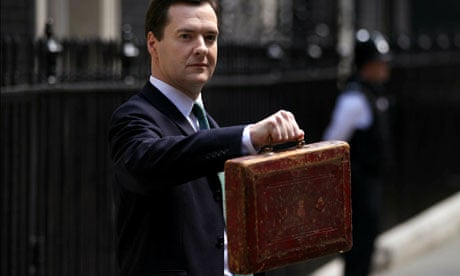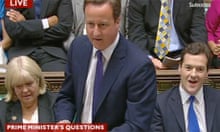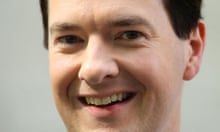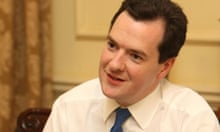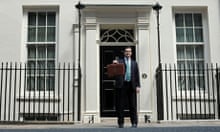George Osborne today announced the deepest cuts ever seen in the public sector by ordering nearly all government departments to slash an average of 25% from their annual budgets before the next general election and announcing a two-year pay freeze for all public sector employees.
The chancellor's announcement of £83bn savings by 2014-15, which will spread across education, police and council budgets, was described as savage by union leaders, suggesting that the coalition will face intense opposition and strikes as the axe falls.
Every area of government – apart from the NHS and overseas development aid, which the coalition has promised to protect – will have to reduce its budget by an average of 25% unless the Department for Work and Pensions can come up with savings in the welfare bill.
Osborne also said he wanted to protect education and defence from the worst of the cuts, indicating other departments will face significantly greater cuts.
The announcement leaves ministers in the coalition cabinet facing a furious battle over the summer to protect their budgets, with each turning to the work and pensions secretary, Iain Duncan Smith, to enforce even more draconian cuts from the welfare bill. Precise limits for every department will be announced in a comprehensive spending review, which has been set for 20 October.
Osborne's cuts include £2bn in cancelled capital projects that have already been announced, £11bn from the welfare budget and £61bn from departmental budgets, as well as £3bn on debt interest. Of the cuts to departmental budgets, £44bn had already been earmarked by Labour, to which Osborne added an additional £17bn.
Some of the departmental cuts will come from the pay freeze announced today. Osborne said: "Many millions of people in the private sector have in the last couple of years seen their pay frozen, their hours reduced, and their pension benefits restricted. They have accepted this because they knew that the alternative in many cases was further job losses. The public sector was insulated from these pressures but now faces a similar trade off."
A review of public sector pensions could find extra savings to reduce the pressures on departmental budgets.
But he said there would be no further cuts to capital budgets, though some major programmes such as the Building Schools for the Future scheme would be reformed and reprioritised. The budget document also reveals that, despite the cuts, once inflation is taken into account spending will still rise overall each year from £637.3bn this year until £711.4bn in 2015/16.
Brendan Barber, the TUC general secretary, said: "Some of the really bad news is yet to come. Unprotected departmental budgets will be savaged. Local government will need to slash services if they are to freeze council tax.
"Public servants did nothing to cause the slump but are being asked to bear an unfair share of the burden. A wage freeze when inflation is high is a real cut in living standards – and the small concession for the low paid is still less than inflation."
